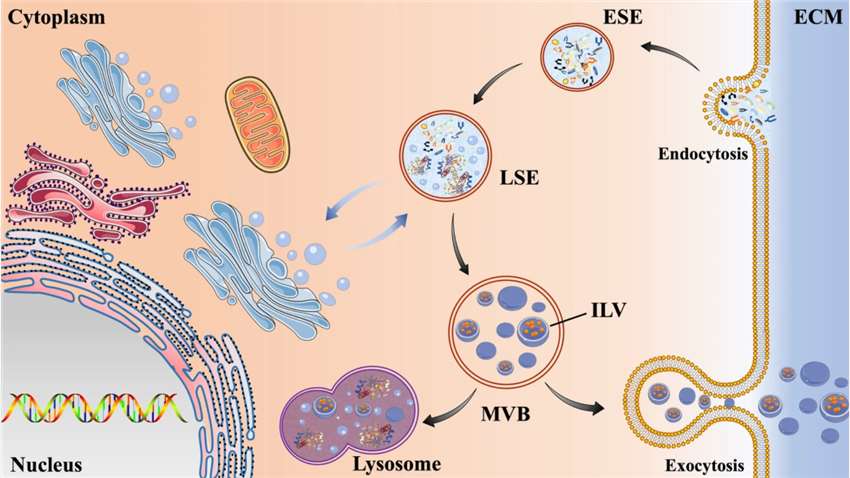Neurological Disease Exosome Research Solution
Online InquiryExtracellular vesicles (EVs), including exosomes, are one of the important forms of intercellular communication. In the nervous system, exosomes are not only involved in intercellular communication, but also in the maintenance of myelin sheaths and the removal of waste products. Similarly, exosomes in the brain can play both positive and negative roles in central nervous system disorders involving stroke, Alzheimer's disease (AD), Parkinson's disease (PD), traumatic encephalopathy (CTE), and so on. Creative Proteomics is a leading service provider in exosome research and analysis. Based on cutting-edge technology, advanced platforms, and strict analysis workflows, our experienced experts can provide customized and comprehensive exosome research services to support neurological disease exosome research. We are proud to offer a range of exosome-related services, such as exosome isolation, identification, engineering, and multi-omics analysis.
 Fig. 1 The secretion process of exosomes. (Fan, Y., Chen, Z., & Zhang, M., 2022)
Fig. 1 The secretion process of exosomes. (Fan, Y., Chen, Z., & Zhang, M., 2022)
The role of exosomes in neurological disease
Studies have shown that exosomes from the central nervous system can be found in cerebrospinal fluid and peripheral body fluids and that their levels vary with the disease state. Since they contain a variety of bioactive materials, exosomes are considered a snapshot of the intracellular environment. Moreover, exosomes are highly stable in the peripheral circulation and can penetrate the blood-brain barrier (BBB). Therefore, exosomes may be an attractive prospect in central nervous system diseases because they can be utilized as biomarkers to monitor disease development, and enable early diagnosis, as well as therapeutic tools for optimizing treatment.
Neurological disease exosome research solution at Creative Proteomics
Creative Proteomics is committed to a culture of continuous improvement, innovation, and world-class customer support. For years, based on knowledge and experience in exosome research and analysis, we have been offering sustainable innovative services and solutions at low maintenance costs according to our global customers' needs.
Notably, exosomes are involved in the process of AD development and play a multifaceted role in AD. Previous studies have shown that exosomes may facilitate the spread of AD in the brain by carrying pathogenic proteins. They may induce apoptosis of astrocytes, thereby impairing neuronal function during disease progression.
A growing body of research suggests that exosomes, a type of EVs, are one of the potential mechanisms by which pathological α-synuclein propagates throughout the brain. The ability of exosomes to transport active substances between cells, including microRNAs (miRNA) and mRNA implicated in PD pathology, provides key insights into how exosomes contribute to the development and progression of PD.
Exosomes may serve as a potential source of novel, noninvasive biomarker and a possible carrier of novel therapeutic approaches for HD. However, the use of exosomes as biomarkers and carriers in HD is still in its early stages and more studies are needed in this area.
After a stroke, brain cells, blood cells, and endothelial cells release exosomes in response to stroke. These EVs can promote nerve regeneration, enhance neurological recovery, and regulate peripheral immune responses, participating in increasing long-term neuroprotection after stroke. Moreover, they also enhance angiogenesis, neurogenesis, axon dendritic remodeling, and brain reconstruction.
Our customer service representatives are available 24 hours a day from Monday to Sunday. If you are interested in these fields, please don't hesitate to contact us. Our experts will give you satisfactory answers and facilitate the progress of your projects.
References
- Liu, Wanying, et al. "Role of exosomes in central nervous system diseases." Frontiers in molecular neuroscience 12 (2019): 240.
- Fan, Yishu, Zhuohui Chen, and Mengqi Zhang. "Role of exosomes in the pathogenesis, diagnosis, and treatment of central nervous system diseases." Journal of Translational Medicine 20.1 (2022): 1-15.
* For Research Use Only. Not for use in diagnostic procedures.



